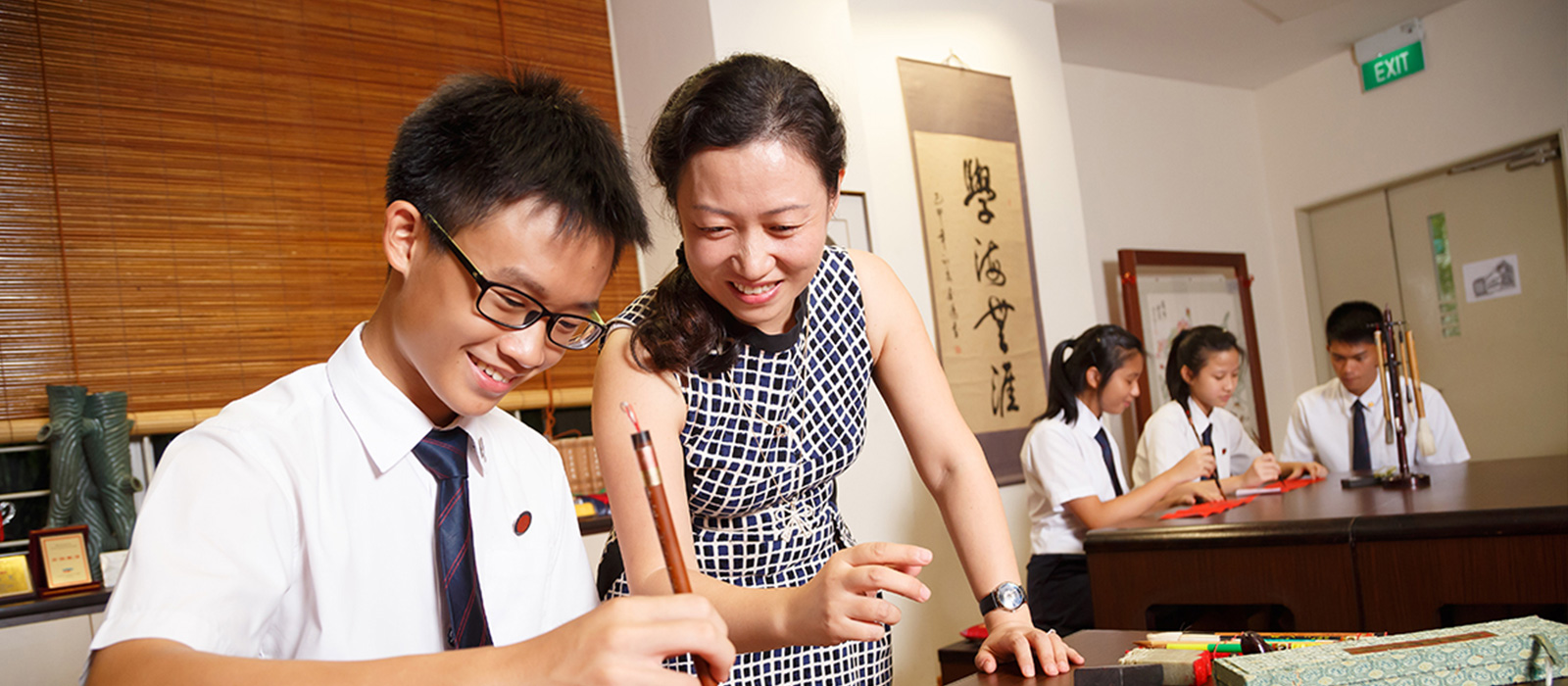Mother Tongue Languages

Curriculum 课程内容
The Mother Tongue Languages Department is committed to delivering top-quality Mother Tongue Language programmes that intrinsically motivate and inspire Dunmanians to use and enjoy the Mother Tongue Languages. Our experienced team of teachers has designed a variety of programmes for the students to choose from according to their interests.
| Subjects Offered | Junior High | Senior High |
|---|---|---|
| 1. | GCE ‘O’ Level Higher Chinese/ Chinese (Compulsory for Year 1 to Year 4) | Chinese Language ‘B’ |
| 2. | Literature in Chinese (Humanities Elective for Year 3 and 4 students; compulsory for CLEP-Sec students) | H1 Chinese Language/H1 Malay Language/ H1 Tamil Language (Students offering H1 Tamil Language will be having lessons in another JC) |
| 3. | Bicultural Studies Programme (MOE) (For Year 3 and Year 4 BSP students) | H2/H3 Chinese Language & Literature |
| 4. | Appreciation of Chinese Culture (Compulsory for Year 1 and 2 students) | H2 China Studies in Chinese (Compulsory for BSP scholars) |
| 5. | Conversational Malay (Compulsory for Year 1 and 2 students) | H2 Translation (Chinese) |
| 6. | Malay (Special Programme) (optional 3rd Language for students) | - |
在致力于为学生提供优质多元课程、并寓乐于教的理念的指引下,在强大的师资力量的支持下,我们为学生精心设计了丰富多元的母语课程,供学生根据自己的兴趣爱好灵活选择。
以下是华文部所提供的科目:
| 科目 | 初中部 | 高中部 | |
|---|---|---|---|
| 1. | ‘O’ 水准高级华文/华文(中一到中四所有学生必修) | 华文 ‘B’ | |
| 2. | 华文文学 (中三、中四学生的人文选修科;初中语特学生必修) | H1华文/H1 马来文/H1 淡米尔文 | |
| 3. | 教育部双文化课程 (中三、中四学生选修) | H2/H3 华文与文学 | |
| 4. | 中华文史华艺鉴赏课程 (中一、中二学生必修) | H2 中国通识(双文化奖学金得主必修) | |
| 5. | 马来语会话(中一、中二学生必修) | H2 翻译(华文) | |
| 6. | 马来文(特别课程)(供学生选修的第三语文科目) | - | - |
Pedagogy 教学法
Our Mother Tongue Language teachers employ a plethora of pedagogies to improve students’ language abilities and cultural appreciation, nurturing them into passionate users of the language. Teachers differentiate their teaching methods based on students’ abilities and content.
母语老师以提升学生的母语能力和文化素养为宗旨,综合采用多样化的教学法,帮助学生活学善用。老师们也注意因材施教,针对不同学生和不同内容,灵活采用多种教学方法。
Some of these methods include:
- Verbal methods, for example direct instruction by teachers, peer discussion, oral presentations, etc.
- Visual methods, for example demonstrations during lessons or fieldwork research, etc.
- Experiential methods to train skills and techniques, for example practice, experimenting, immersion, etc.
In terms of teaching methods, teachers often use Socratic Questioning and Socratic Seminars to cultivate students’ critical thinking, encouraging students to voice their own perspectives, views and suggestions.
Teachers use Richard Paul’s Wheel of Reasoning model to guide students in their logical thinking process. Through the eight elements of thoughts, students will be able to consider problems, issues and perspectives. Through classroom activities, students will practise making inferences, evaluating answers, recognising different perspectives and other logical deduction skills, all of which are essential to language learning.
这些教学法基本包括:
- 以语言形式获得间接经验的方法,包括老师的讲授,同学之间的讨论、口头报告等;
- 以直观形式获得直接经验的方法,如演示法,田野考察等;
- 以实际训练形式形成技能、技巧的方法,如练习法,实验法,实习法,浸濡等。
在教学技巧上,老师们也常使用苏格拉底提问法和苏格拉底研讨会来培养学生批判性思考的能力,并鼓励学生提出自己的看法、意见和建议。
老师也使用保罗思维模式来引导学生进行逻辑性思考。通过有效思考的八个元素,学生学会仔细和有意义地思考问题、课题及观点。通过活动,学生也练习提出推论、评估答案、辨识不同角度的观点以及其他逻辑理论等技能,而这些技能是各个语言学科的主要技能。
为了强调华文课程和生活的联系,老师们尽可能选用最真实的语料。比如,通过演讲辞、广告以及新闻篇章,学生不但能提升语感,也能更好地体会华文在生活中的实用性。每周定期的读报活动,也让学生更关心时事,了解社会,从而培养“心系祖国,放眼世界”的情怀。
Assessment 评估与测试
Under the Mother Tongue Languages Department, students are assessed holistically through formative and summative assessments. The latter emphasizes knowledge acquisition and reproduction in a time-trial environment, and is more relevant to subjects like the literary component of H2 CLL or H2 CSC.
德明母语部门通过形成性评估与总结性评估等方式对学生进行综合评估与考核。总结性评估的使用,大多对于学术性质要求较高,如华文/淡米尔文文学以及中国通识等,多见于高年级应考准备中。
Summative assessment is crucial in assessing students on their understanding and analysis of key concepts. Formative assessments, on the other hand, are more widely used in subjects like the Bilingual Programme, as well as the Appreciation of Chinese Culture. Through formative assessment, students are given customized guidance over a period of time to complete a task-based assignment, and are assessed for their performance during the process on top of the end product.
In addition, as part of their A level H2 CSC examination requirement, students are also required to submit a 4000-character Independent Research Essay that accounts for 30% of the results. This research essay covers contemporary aspects of China, namely politics, economy and societal issues. Students begin their preparation in the early stages of Year 5, and are closely monitored and guided by their CSC tutors until the submission of the essay in September the following year. This research essay reflects the combination of formative and summative assessment, and is an academic challenge to students offering the subject.
总结性评估是考核学生对重要概念的灵活分析与应用的重要方法。形成性评估则以专题作业、小组汇报等形式展开,多见于低年级以及深广性质较强的学科,如中华文史鉴赏、双语课程等等。
此外,根据H2中国通识考试要求,应考学生需要就当代中国的政治、经济、社会状况完成一篇4000字的独立研习论文,且此论文的成绩占这门学科总成绩的30%。论文的撰写在高一上半年开始,至高二下半年呈交考评局,全程由中国通识老师密切监督与指导。独立研习论文的撰写,在很大程度上反映了形成性评估与总结性评估的结合,对于学生乃是极大的学术性挑战。

